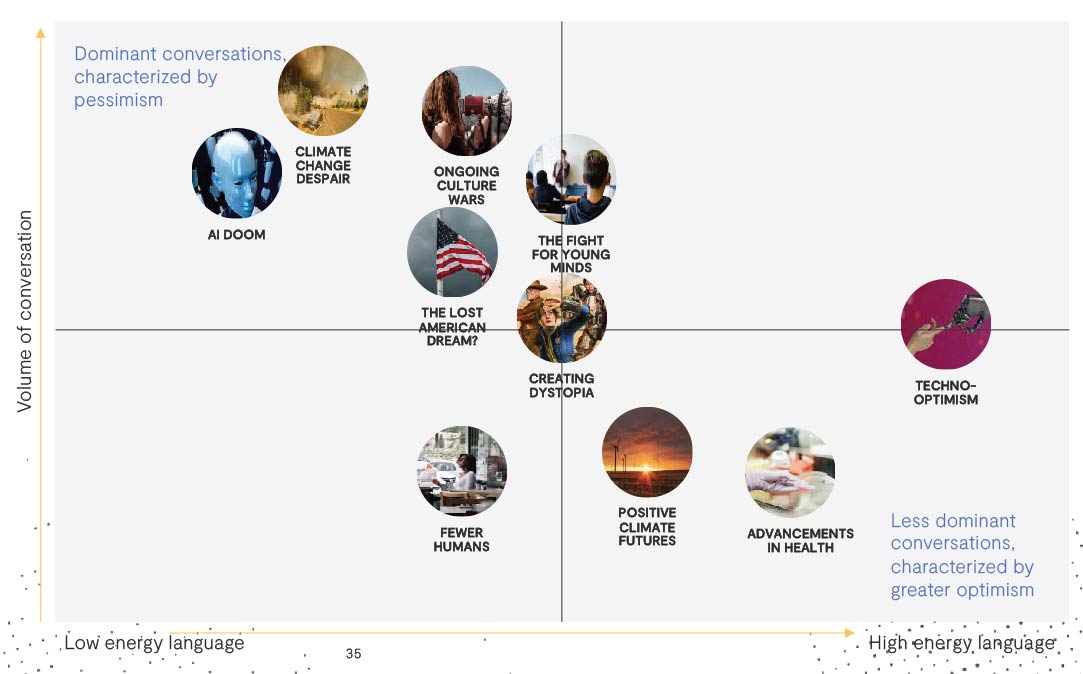Exploring Americans’ Visions of the Future
In Partnership with discover.ai
May 31, 2024
What do US citizens – particularly younger citizens – think the future holds,
and how might this help shape a more positive collective destiny?
As an existential psychologist who studies human motivation, I believe that cultivating a positive vision of the future is essential to building a better tomorrow. Unfortunately, existing research suggests that there is much work to be done. Numerous surveys indicate that Americans, particularly young adults, are increasingly pessimistic about what lies ahead. Such surveys are important because they provide a quantitative snapshot of current sentiments about the future. However, they don’t capture the more naturalistic and nuanced discussions occurring in online spaces, where many people, especially younger generations, share their hopes, fears, and expectations for their personal lives, society, and the world at large.
To address this limitation, the Human Flourishing Lab partnered with discover.ai to conduct an in-depth analysis of online conversations about the future. By delving into the thoughts and feelings being shared across various digital platforms, we gain a more comprehensive understanding of the complex emotions, beliefs, and discussions that shape people’s outlook on the future. These insights are crucial for those of us committed to encouraging a more positive and aspirational vision that inspires individuals to recognize and act upon their power to improve not only their own lives but also the lives of others. By tapping into the rich data provided by discover.ai, we can develop strategies and narratives that resonate with young Americans to promote a sense of agency and hope that will help advance human progress and flourishing.
ABOUT DISCOVER.AI
discover.ai captures the mood and tone of current conversations online to bring us deep cultural insight.
Our question: What can we learn from online conversations regarding the future envisioned by US citizens, particularly younger generations, for the nation and the global community? How might these insights be used to drive a meaningful and authentic vision of human progress?
We brought together rich and inspiring language from 137 online sources across 11 categories covering the USA.
- Social media search based on keywords linked to future / hope / optimism / fears / mental health across different societal spheres
- Social media search based on keywords linked to future / hope / optimism / fears / mental health across different interpersonal spheres
- Cultural journalism articles about Gen Z and their collective views/behaviours across different aspects of life
- Websites and articles that talk about human progress, visions of the future, futurists/futurism, ‘future of’, dystopian/utopian visions etc., e.g., McKinsey, 2050.earth
- Websites, articles, blogs and forums that discuss topics such as hope for the future, building hope, reasons to be optimistic
- Articles, blogs, forums and websites that focus on mental health and the issues negatively impacting it
- Blogs and online publications that cater to Gen Z and cover topics related to the future e.g., Medium, Vox, Vice
- Online content that explores gender differences in how the world is perceived/experienced
- Parenting blogs, forums and websites aimed at parents of Gen Alpha that talk about/address parenting fears and challenges linked to the external world and the world their children are inheriting
- Mainstream psychology magazines online and websites with a psychology angle for consumers e.g., Psychology Today, Nature, Time magazine
- Websites/articles/blogs/forums that feature/discuss the work of creatives and how their visions/storytelling shape perceptions of the future e.g., movies, songs, books
KEY INSIGHTS
Mapping the Volume and Positivity of Conversation
This map gives a qualitative sense of where the volume of conversation lies within our data set, as well as the nature of the language being used. Volume of conversation gives a sense of the dominance of a theme, or how mainstream it is considered to be.
‘Energy’ is a read on the level of positivity and drive that is captured within the language used across these spaces. High energy language has a greater level of excitement, optimism, and sense of ideas and potential. Conversely, low energy language indicates spaces that are lacking in positivity, hope, or motivation. A sense of energy can provide a useful guide when considering how to prioritize engagement with citizens based on topics that are gaining traction and have emotional resonance.

CONCLUDING THOUGHTS
- The purpose of this research has been to illuminate some of the different perspectives US citizens’ have with regards to the future of their country and the global community. It has highlighted different and polarized views, much of which points to pessimism and anxiety. But there is also positivity and hope expressed – it’s not all doom and gloom.
- To advance human progress it is important to listen to these conversations, to understand people’s thoughts and fears, as well as their hopes and aspirations. Only then can we build on them.
- Americans have diverse political beliefs and policy preferences, as well as divided opinions on the role of government versus the private sector in addressing big challenges. However, regardless of these differences, it is important to collectively shape positive visions of the future. This will foster greater creativity, constructive conversations, collaboration, and compromise, in the service of solving today’s problems and building a better tomorrow.
- This endeavour isn’t about encouraging false hope or hubris, but a desire to embrace a realistic and aspirational outlook on what is possible and celebrate our potential.

A project of the Archbridge Institute
The Archbridge Institute is a non-partisan, independent, 501(c)(3) public policy think tank. Our mission is to lift barriers to human flourishing.
Sign Up For Our Newsletter
Contact
Archbridge Institute
1633 Connecticut Ave. NW, Suite 300,
Washington, DC 20009

